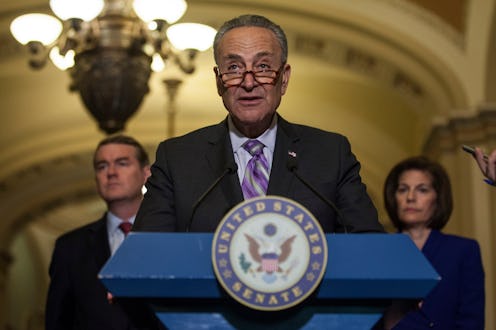News
This Is The Crass Technique Democrats Should Use To Kill The Health Care Bill

With Senate Majority Leader Mitch McConnell's announcement this week that Republicans would delay their health care bill vote, Democrats have some extra time to launch their best line of attack. And according to political strategists, while it may sound crass and opportunistic, Democrats need to double down and bring the stories of sick people across the country to the forefront.
Eric Jaye, founder and president of Storefront Political Media, says that the best thing Democrats have going for them right now in this health care fight is that the Republicans' strategy to pass this bill did not pan out in the seemingly nefarious way they intended.
“They felt like, in order to pass the bill they wanted, they needed to do it in the dead of night and do it quickly," Jaye tells Bustle. "That plan, while abhorrent from a public policy standpoint, had a certain political wisdom to it. Once you start discussing the consequences, you start having reporters interviewing grandma who's going to lose her healthcare and Uncle Bill whose going to get unplugged from his dialysis and families who have a kid with cancer who are going to be denied coverage because of a pre-existing condition."
Jaye says that because of the delay — and especially its timing heading into Fourth of July weekend — this bill and its consequences will dominate "social media posts and backyard barbecue talks" for days. That, in turn, will be detrimental to Republicans' momentum with this bill. Thus, Democrats need to capitalize on this surge in interest, by keeping the stories of the mostly affected citizens at the forefront of these discussions.
Jaye says the party's biggest advantage in this debate is that it can show the public in real, relatable terms the dire effects this bill will have on a sympathetic demographic: sick people.
Politics can be cruel in the abstract, but Americans have a tendency to be quite kind to each other when they can see each other. Republican voters don’t want to deny granny her health care.
“Democrats need to hold the votes they have now," he says. "The way to do that is to move the discussion away from the theoretical, away from the ideological, to the specific and personal. Politics can be cruel in the abstract, but Americans have a tendency to be quite kind to each other when they can see each other. Republican voters don’t want to deny granny her health care.”
Democrats actually have an advantage with this health care battle that Republicans lacked back in 2008 when the Affordable Care Act was being debated. Because no legislation existed for comparison, the potential effects of Obamacare were all theoretical. This time around, Jaye says, Republicans are at a disadvantage because people can understand in very real terms what it would mean to lose their coverage, or have premiums increase.
“The Republicans are grappling with a very hard political reality that it isn't a theoretical debate any longer," Jaye says. "The status quo now is that there are 20 million or more Americans that have health care, who didn’t have it before, who will lose it under this bill. It’s pretty hard in American politics to extend entitlements, but it’s almost harder to roll them back."